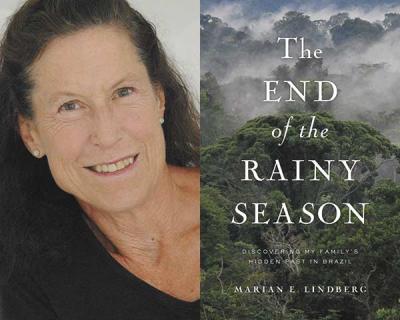Adventures in Ecology

“The End of the
Rainy Season”
Marian Lindberg
Soft Skull Press, $15.95
In “The End of the Rainy Season: Discovering My Family’s Hidden Past in Brazil,” Marian Lindberg explores questions that all children eventually ask: How reliable are our parents? How sound is their version of reality? Can I trust their stories about the past?
In Ms. Lindberg’s case, these questions are entwined with personal questions about her romantic life, her health, her role as a parent, and her professional choices, as well as questions of greater scope, such as the impact of explorers on the environment and our responsibility to conserve land. The latter issues are no surprise, as Ms. Lindberg works at the Nature Conservancy. But her book is full of surprises, the most important being that a quest for knowledge can bring the most unexpected results.
Ms. Lindberg weaves together several narrative threads: her own memoir, which includes her struggles with health, right livelihood, and romance; each of her parents’ life stories, which include issues of class and gender roles; the history of the sinking of the Vestris, a ship bound for Brazil, the sinking of which resulted in much loss of life due to the captain’s poor judgment, and the history of explorers in Brazil.
On one hand, such a cacophony of narratives might seem a misguided overreach, but, in the context of Ms. Lindberg’s understanding of ecology, her authorial choice to include so much seemingly disparate material is actually a successful wedding of form and content, as the multiple narrative connections embody ecological thinking. As she writes:
“It occurs to me that those of us who accept scientific theories about the importance of the Amazon rainforest to the planet are a little like Brazil’s indigenous people of the past. We have no land titles, no deeds, no property rights in the conventional sense. Yet we feel our lives and our children’s lives depend in part on this place, and we believe that gives us a natural right to care and demand responsible action by those on the ground in Brazil.”
Ms. Lindberg treads on tricky ground here, emphasizing similarities at the risk of eliding important differences between the “we” of this passage — her target audience, mostly educated via a Western paradigm of knowledge, who still may exercise much choice about how exactly to react to our connection to the Amazon and other endangered places, and native people of Brazil, whose economic position and education gave them less agency when outsiders staked claim to their home. But Ms. Lindberg’s humility as an author and a thinker and her sensitivity to different perspectives allow her to effectively navigate this terrain.
In addition, the multiple narratives create a book that appeals to many readers. Want a medical narrative? You got it. An adventure story? That too. A romance? Sure. A deeper understanding of immigrant experiences? Yes. Her exploration of raising her son, conceived via a donor, and the unique definitions of family that can grow from such circumstances were especially deft and moving.
Of course, these various threads can be disorientating at times. But, again, this seems a deliberate part of Ms. Lindberg’s strategy — to recreate the experience of revisiting foundational stories of our lives as our understanding changes and old and new versions of reality bump into each other.
The title of the book explicitly refers to an actual season in Brazil, but like many moments in this book, Ms. Lindberg imbues it with a number of meanings. When she explains that the hardest rain comes just before the rainy season ends, readers are prepared for both extreme weather and other types of upheaval.
Ms. Lindberg is at her best as a writer when she allows her observations of the natural world to stand for observations of human psychology and society, in the title and many other places, such as her description of Baltimore oriole migration patterns at the book’s close.
In the end, many questions about the past will never be answered with any certainty, which leads to bigger questions: How do we move forward when our understanding is provisional? How do we make choices based on unstable knowledge? Ms. Lindberg’s big, ambitious book traces a path through this disarray, and in doing so she provides a map for the many migrations we face in the 21st century.
Stephanie Wade is assistant professor and director of writing at Unity College in Maine. She spends summers in East Hampton.
A senior staff writer at the Nature Conservancy, Marian Lindberg lives in Wainscott.
